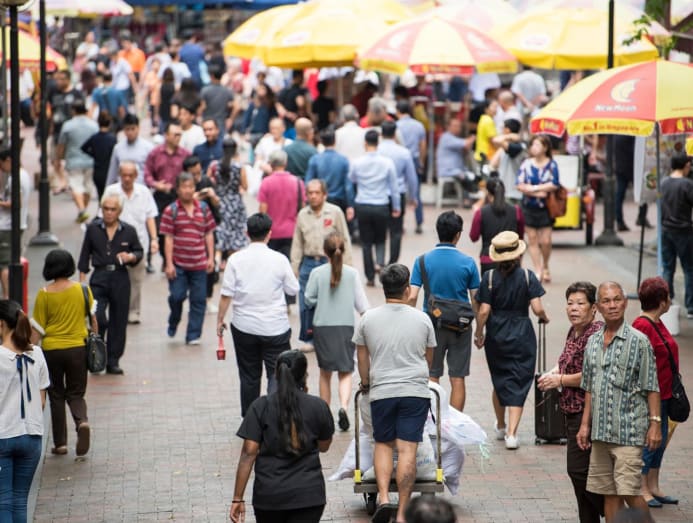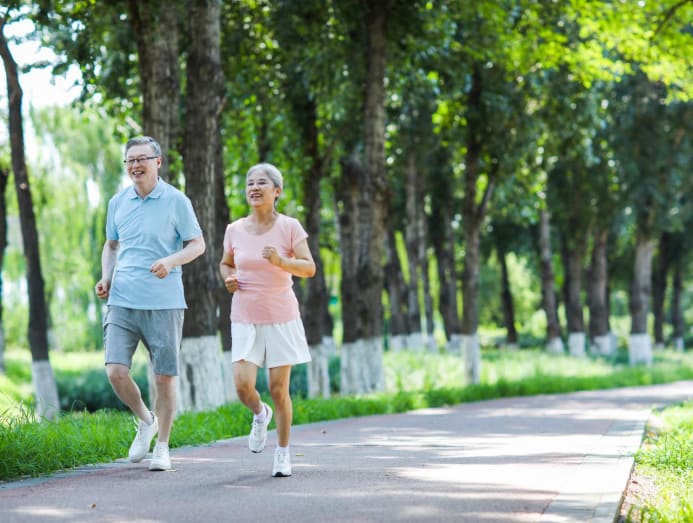Many Singaporeans underestimate the threat of COVID-19, survey reveals

Doctors say it's important for Singaporeans to receive updated vaccinations to protect both themselves and the community against COVID-19. Photos: Shutterstock
Amid continued COVID-19 circulation, doctors emphasise the importance of updated vaccinations to reduce the risk of severe infection.
More than four years have passed since Singapore first implemented circuit breaker measures to stem the spread of COVID-19. With the nation’s gradual transition to living with COVID-19, the city-state appears to have largely returned to a pre-pandemic normal.
Despite COVID-19 being declared endemic, periodic waves of infection continue to occur. The Ministry of Health is urging citizens who haven't received their latest COVID-19 vaccination in the past year to do so, given that infections and hospitalisations are persisting within the community. Vaccine manufacturers are preparing updated vaccines for the next COVID-19 season to address the JN.1 variant and its sublineages, including KP.2.
Physicians say it is important that Singaporeans recognise the need to stay up to date with their COVID-19 vaccines. However, survey results from Moderna Biotech Singapore indicate that many residents believe otherwise.
MORE SINGAPOREANS OPTING OUT OF UPDATED COVID-19 VACCINATIONS
The survey, which was conducted in April in association with YouGov, polled nearly 1,300 adults in Singapore on their attitudes, knowledge and behaviours around living a healthy life and their views on vaccinations for diseases, including COVID-19.
The results suggest an increase in the number of Singapore residents who do not intend to receive their updated COVID-19 vaccinations, rising from 35.2 per cent in 2023 to 40.7 per cent this year. While 49 per cent of respondents acknowledge the necessity of vaccines, suggesting widespread recognition of their importance, the remaining 51 per cent hold contrary views.
These findings suggest that a majority of people underestimate the threat posed by COVID-19, despite its potential for serious short- and long-term health consequences. COVID-19 imposes a heavier burden compared to other respiratory illnesses, with statistics from the US Centers for Disease Control and Prevention revealing that in-hospital death rates were approximately 1.8 times higher for COVID-19-related hospitalisations than for influenza.
Additionally, for those aged over 60 – a group deemed to be at risk from serious COVID-19 outcomes such as hospitalisation and death – the survey shows that over 43 per cent perceive the virus as a “low” or “very low” risk to their health.

“Vaccine hesitancy, particularly among seniors, is a common challenge faced by healthcare professionals,” said Dr Rick Chan, a family physician at Phoenix Medical Group (Novena). “Many seniors have become complacent and are incorrectly starting to dismiss the risks of COVID-19 infections.”
This trend extends to other age groups. Notably, respondents aged 35 to 54, a group commonly regarded as “caregivers”, harbour the most hesitancy about receiving updated COVID-19 vaccinations. Compared to other age groups, they are less likely to view vaccines as necessary or recommend vaccines to their family and friends.
DEBUNKING MISCONCEPTIONS SURROUNDING COVID-19
Dr Leong Hoe Nam, an infectious disease physician at Rophi Clinic at Mount Elizabeth Novena Hospital, highlights complacency, misinformation and concerns about vaccine side effects as primary reasons for seniors’ hesitancy in receiving vaccinations.
“The virus is adapting and mutating constantly; the vaccines we had previously are so different from the current prevalent strains that they now offer less protection,” Dr Leong said. “Patients are still falling severely ill and requiring intensive care.”
He added: “Today’s updated COVID-19 vaccines are specifically designed to address evolving mutations of the virus. Utilising mRNA technology, these vaccines instruct cells to produce a harmless piece of the virus’ spike protein, which triggers an immune response. This prepares the body to recognise and fight the virus if exposed.”
Dr Chan concurs, sharing that he consistently informs his patients about COVID-19 vaccination. “These mRNA vaccines have undergone rigorous testing before they are approved for use,” he said. “While some may experience mild side effects, these are minimal compared to the potential dangers associated with contracting COVID-19, especially for high-risk individuals.”
UNDERSTANDING THE ROLE OF VACCINES FOR OVERALL HEALTH
The survey findings suggest that while people in Singapore recognise the importance of everyday habits for long-term health, they may not prioritise COVID-19 vaccination despite the ongoing circulation of the virus.
Survey respondents ranked COVID-19 vaccinations near the bottom compared to other healthy habits such as getting sufficient sleep, going for regular medical screenings, exercising and maintaining a healthy diet.

“Now that COVID-19 has become endemic, we may underestimate the ongoing risks it poses as we revert to pre-pandemic routines. Some individuals may prioritise sleep, check-ups, diet and exercise over vaccination, possibly due to a lack of understanding of the virus’ severity or feeling immune to its effects due to prior infection or vaccinations,” said Dr Leong Choon Kit, a general practitioner and founder of Mission Medical Clinic. “As a nation, it’s important that we take every measure to safeguard ourselves, our family members and our communities, including staying up to date with the latest COVID-19 vaccinations.”
Ms Evelyn Pang, general manager of Moderna Biotech Singapore, affirmed the company’s ongoing commitment to supporting Singapore in its fight against infectious diseases like COVID-19. “We will continue to raise awareness of these conditions and the role of vaccinations,” she said.
Ms Pang also highlighted the vital role that general practitioners play in safeguarding the population. “They are at the forefront, ensuring patients understand the risks of COVID-19 and the importance of preventive care,” she said.
Learn more about how you can protect yourself and your loved ones from COVID-19.









